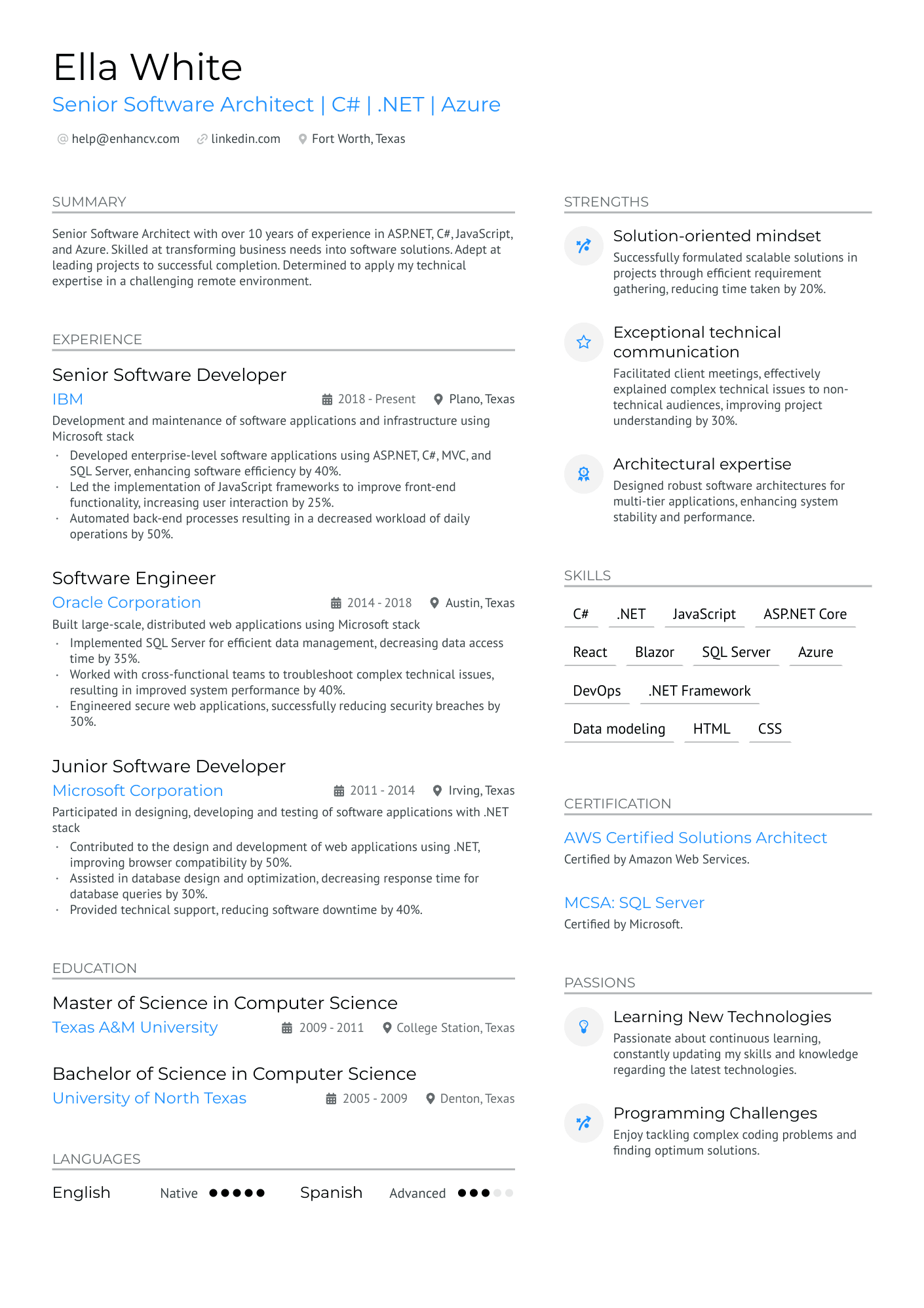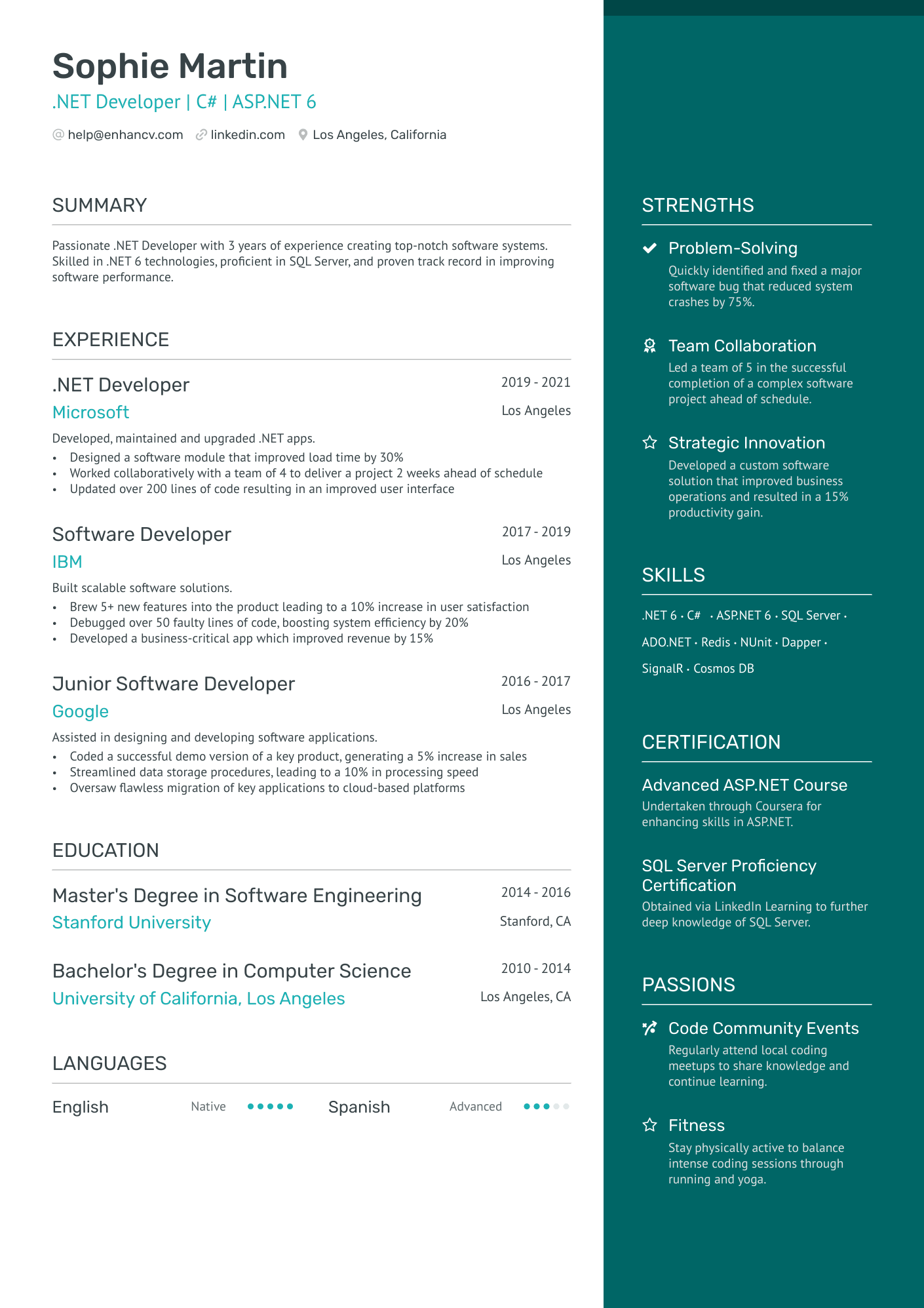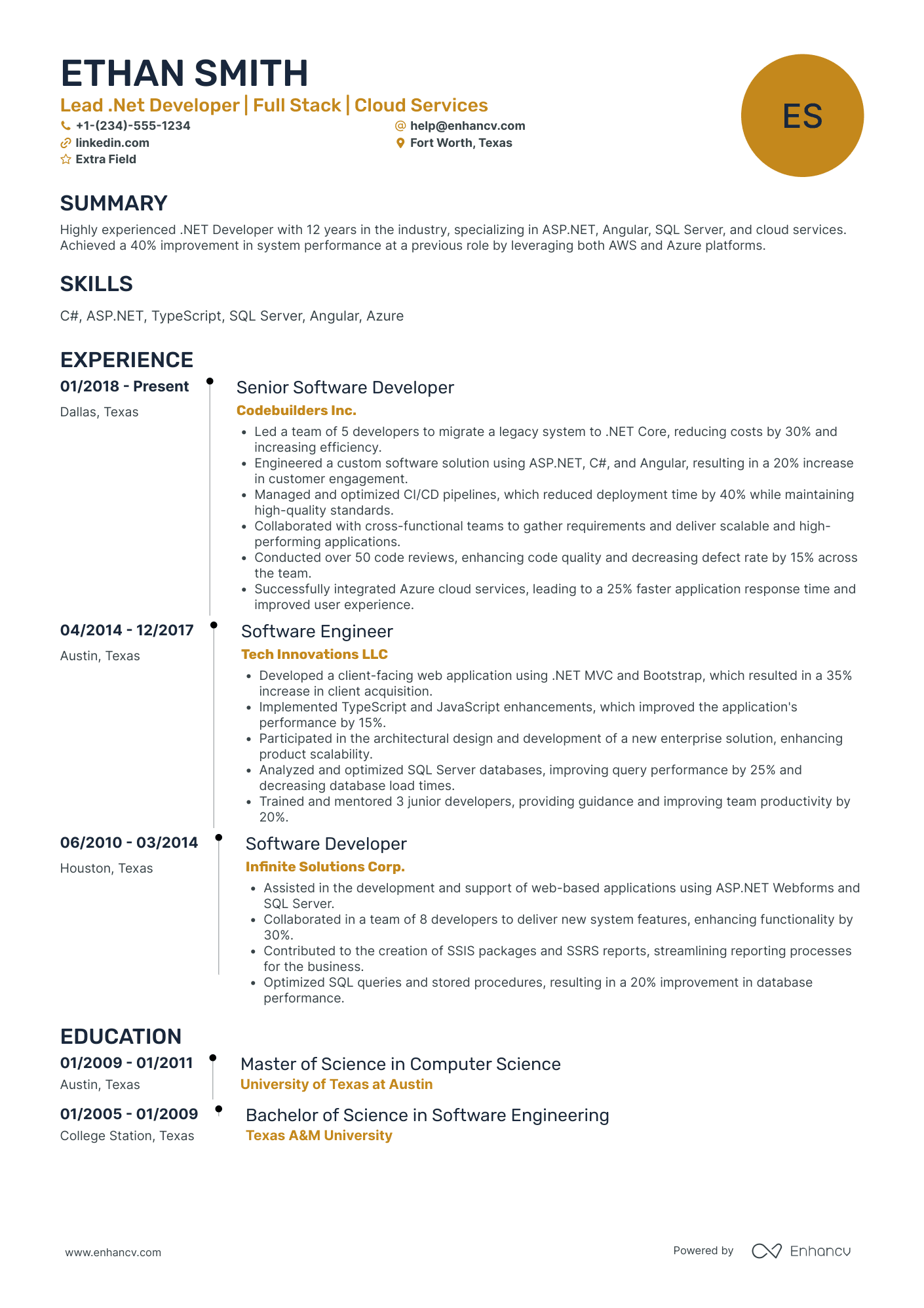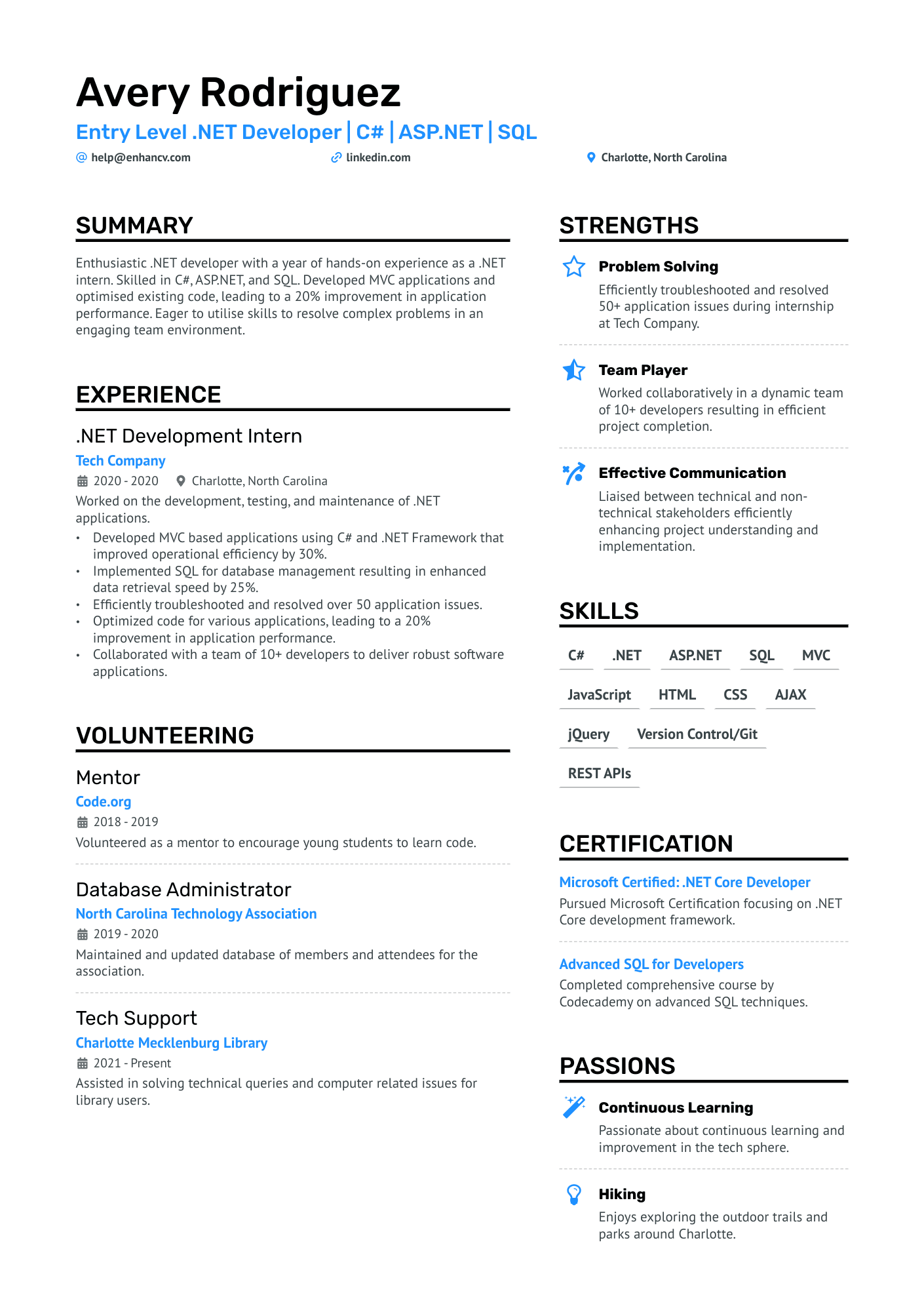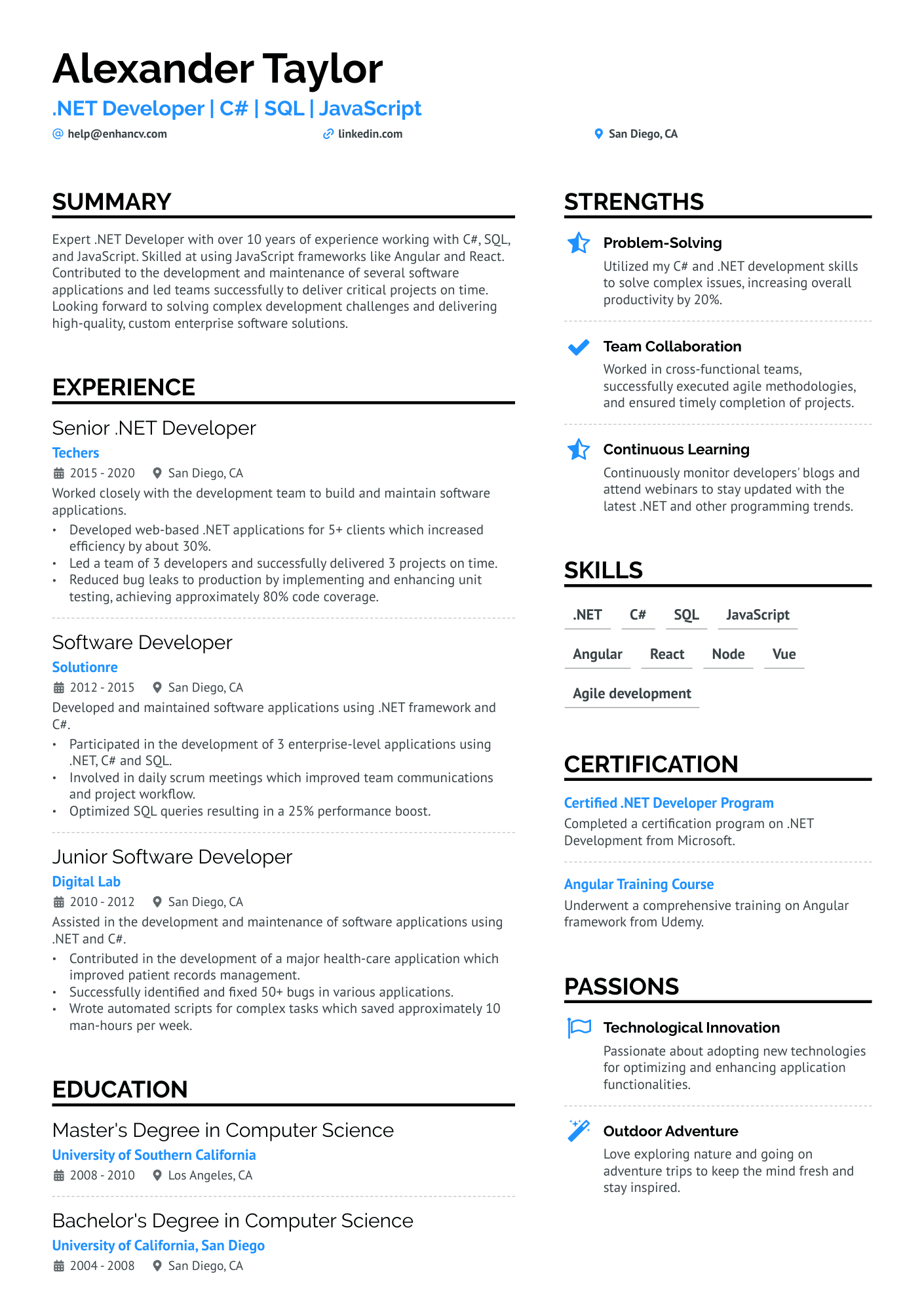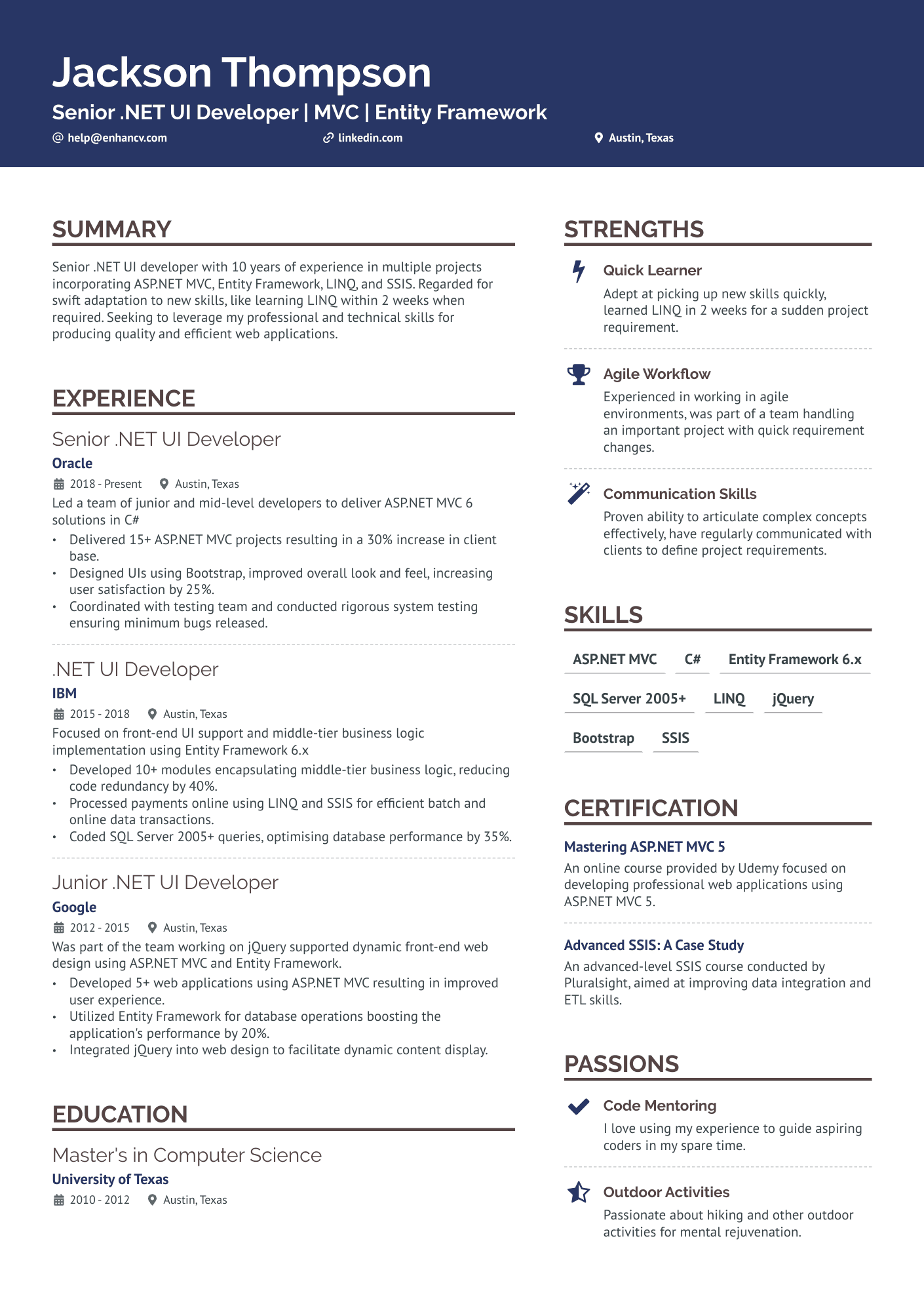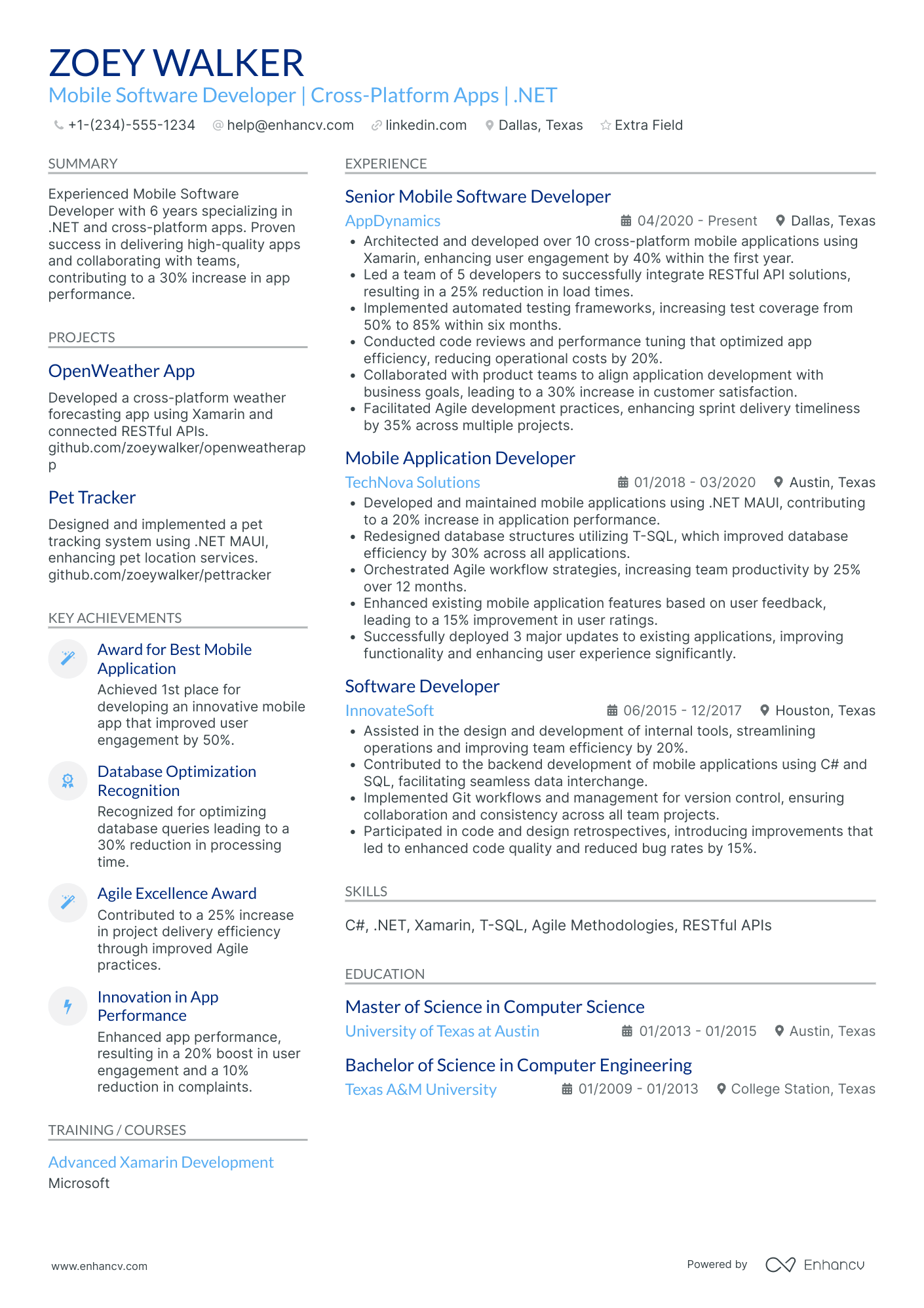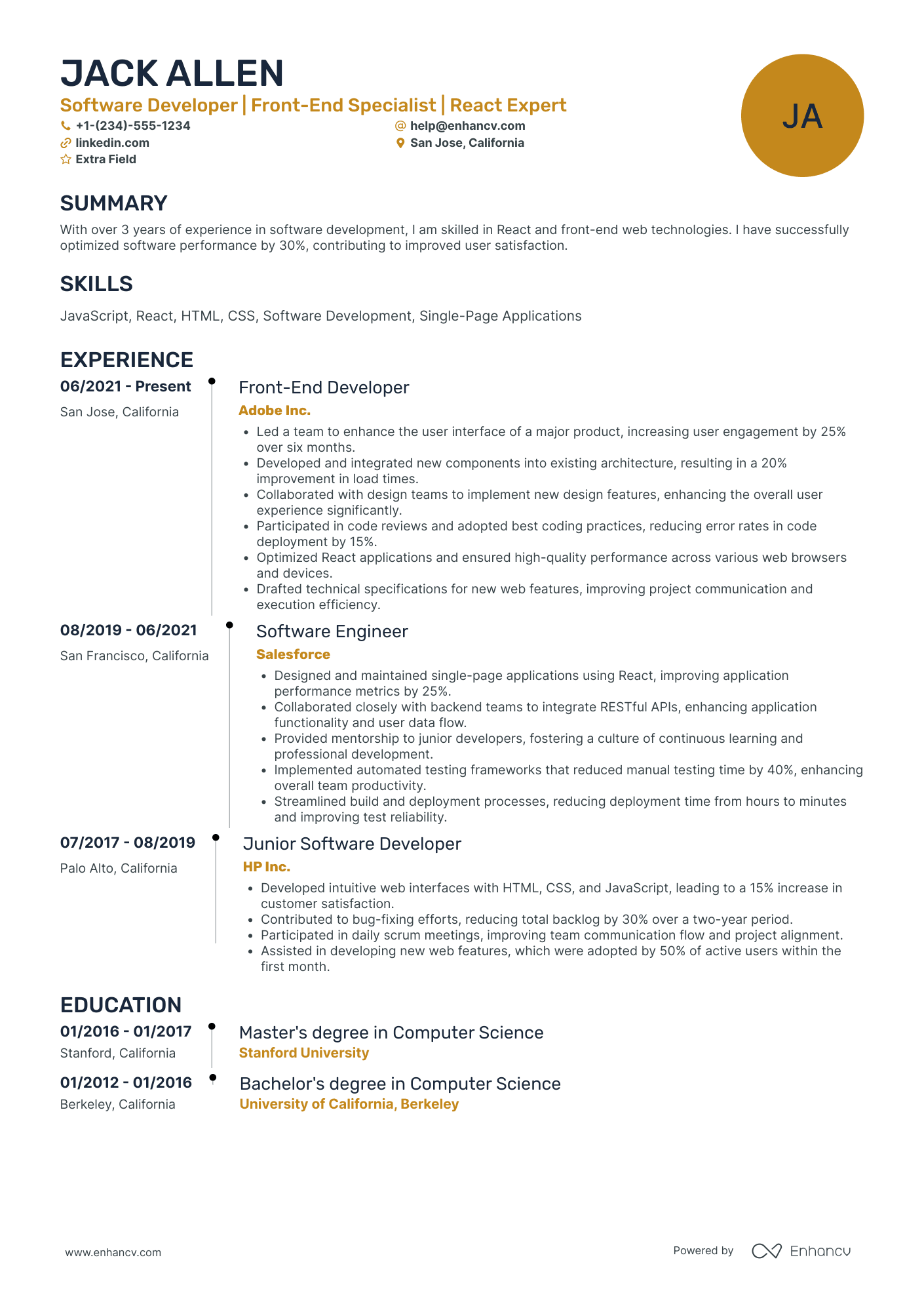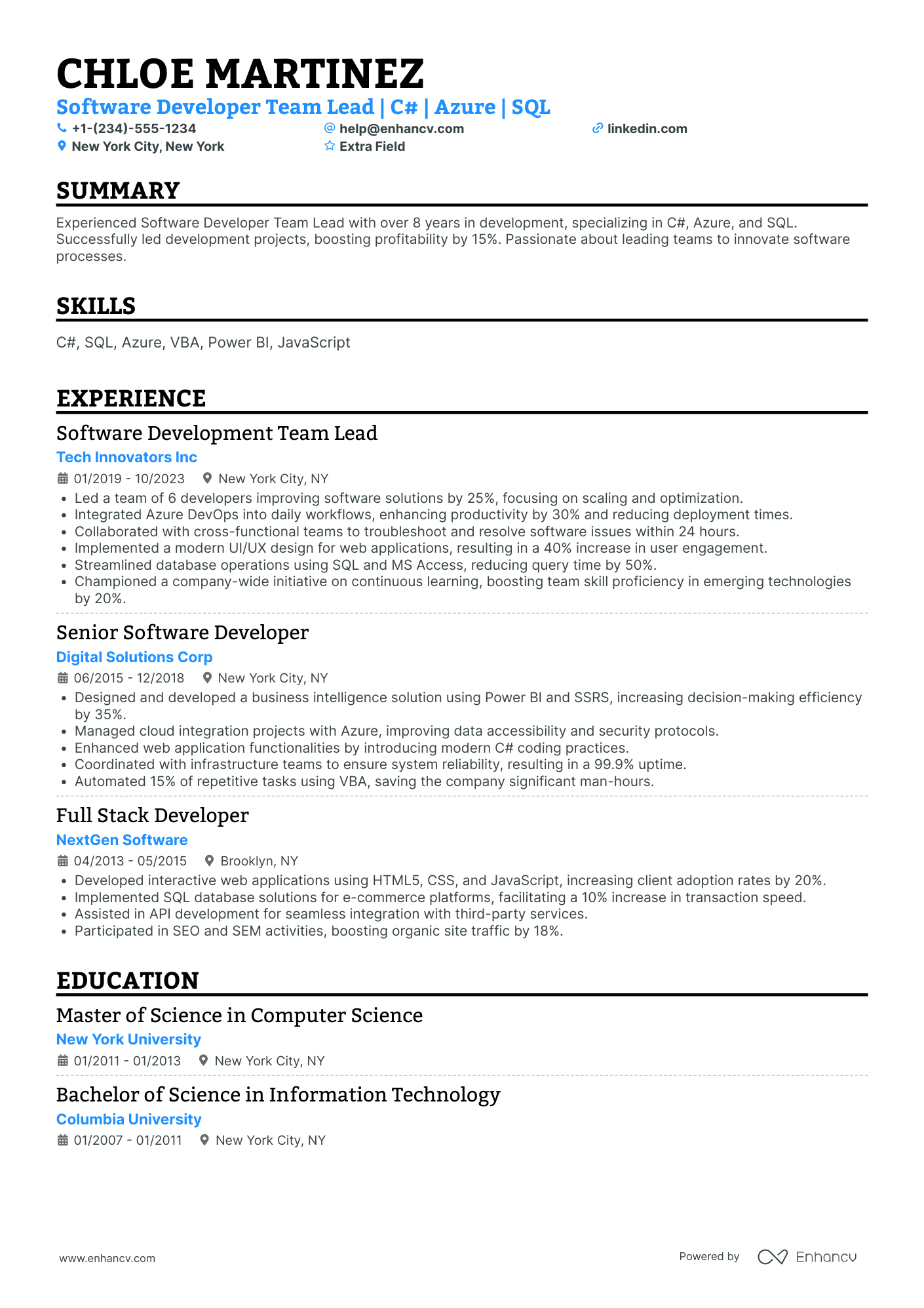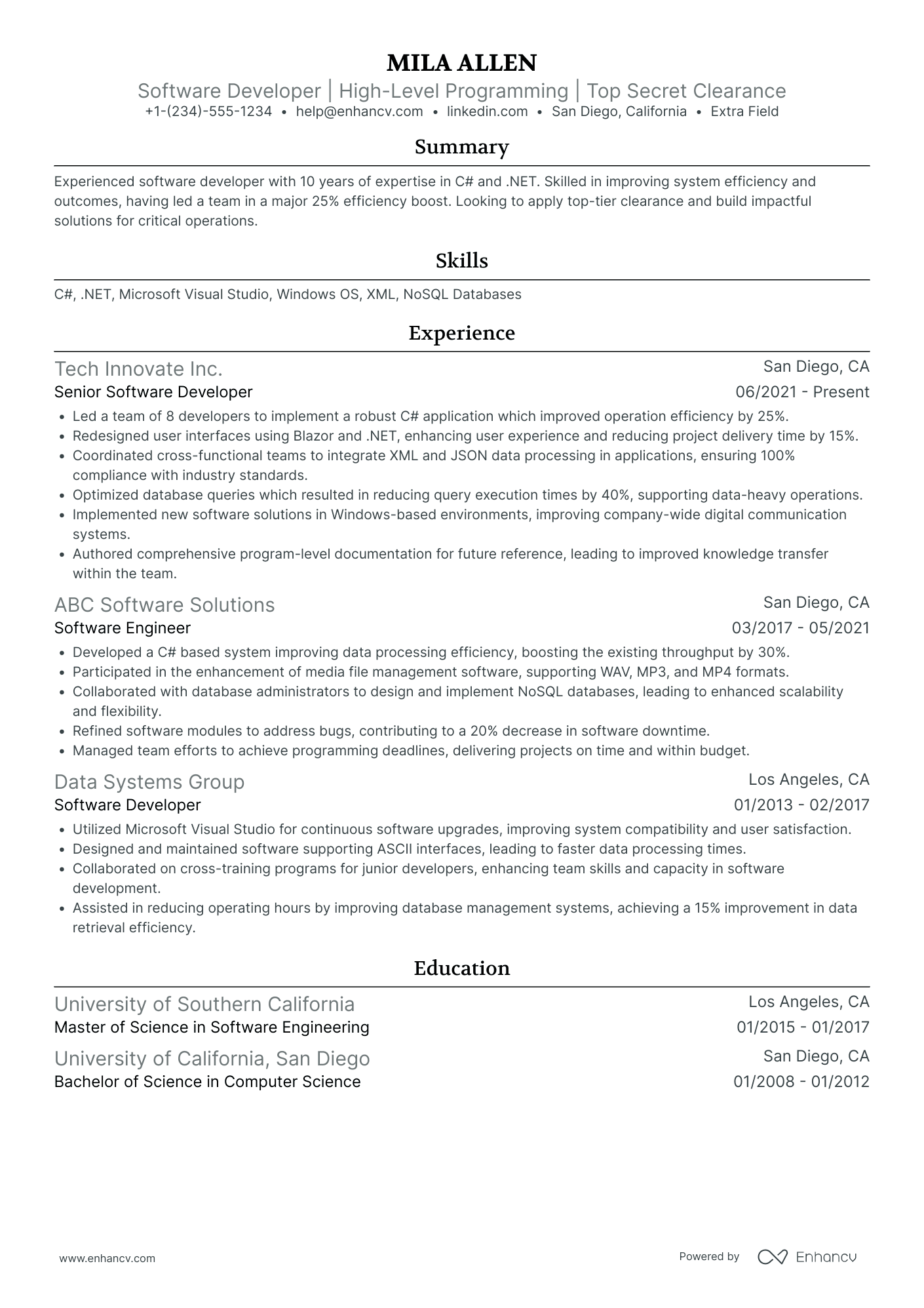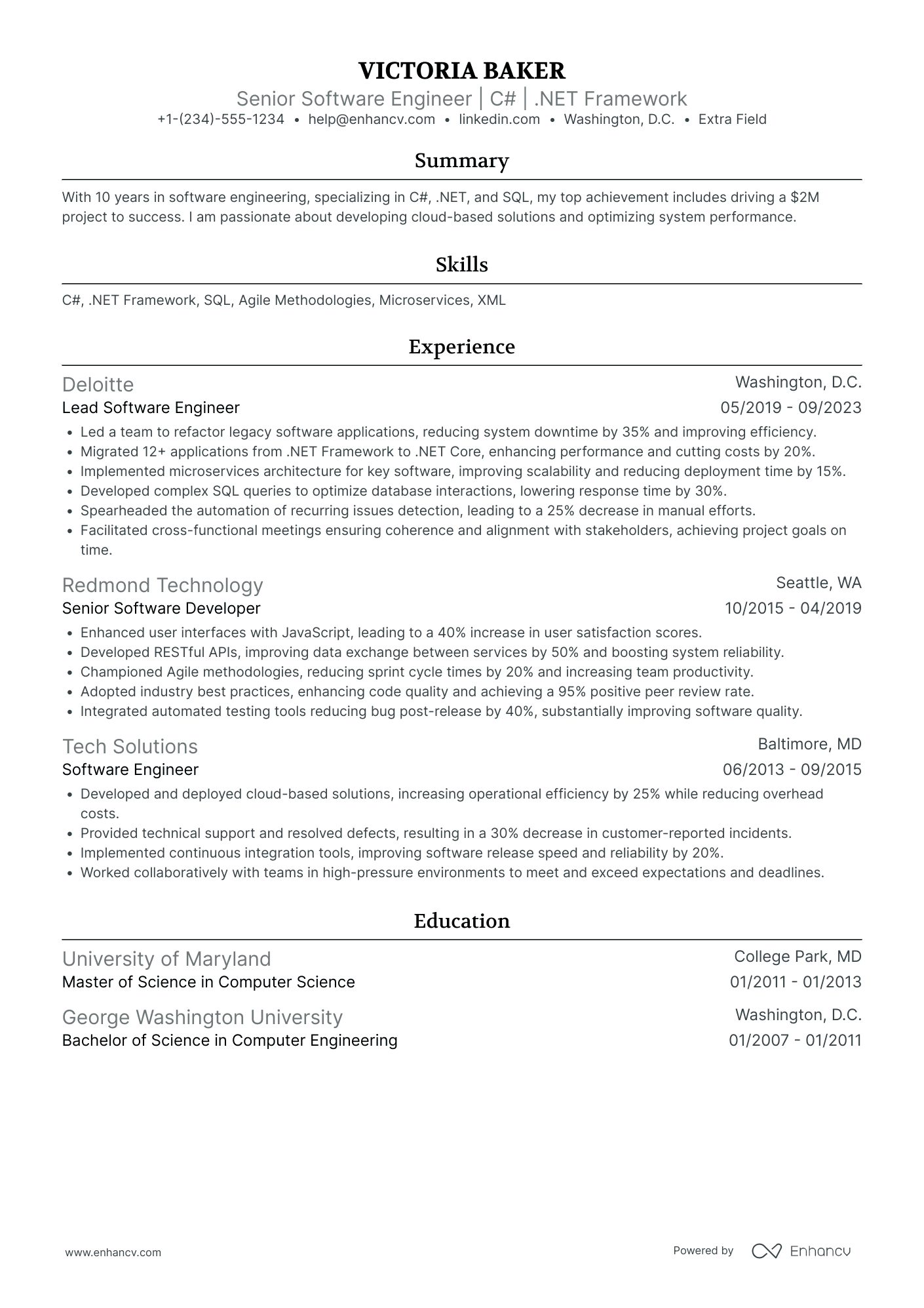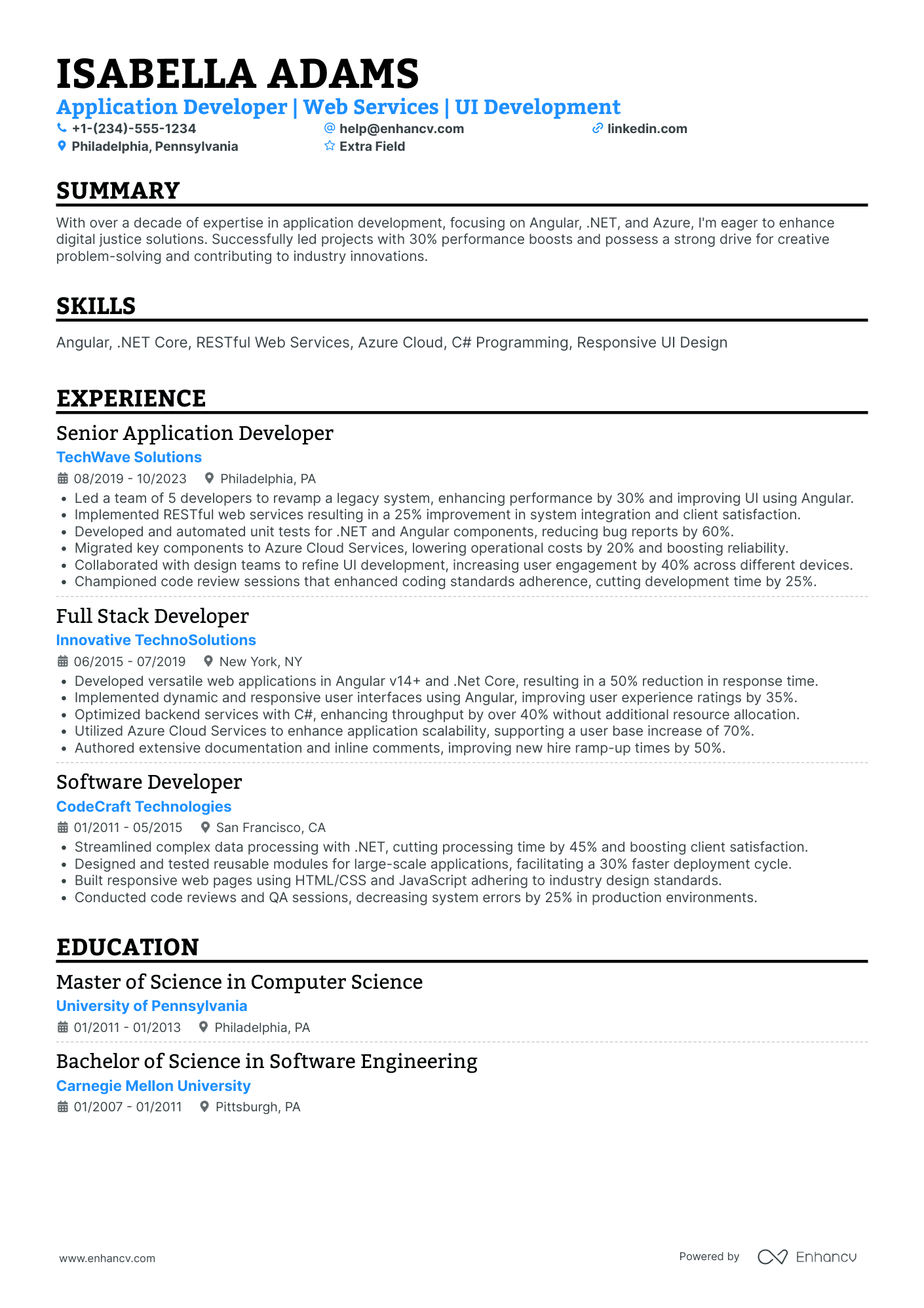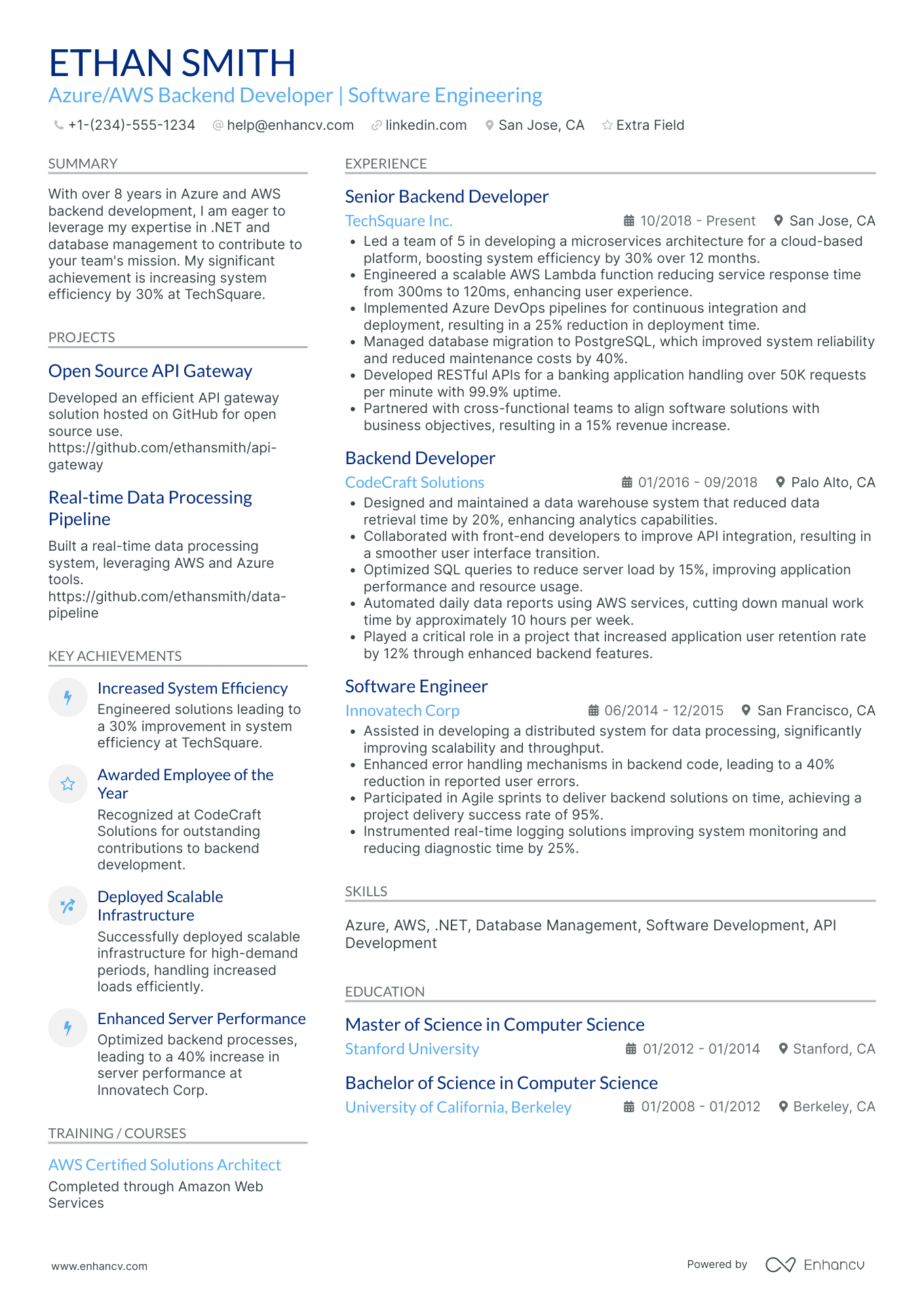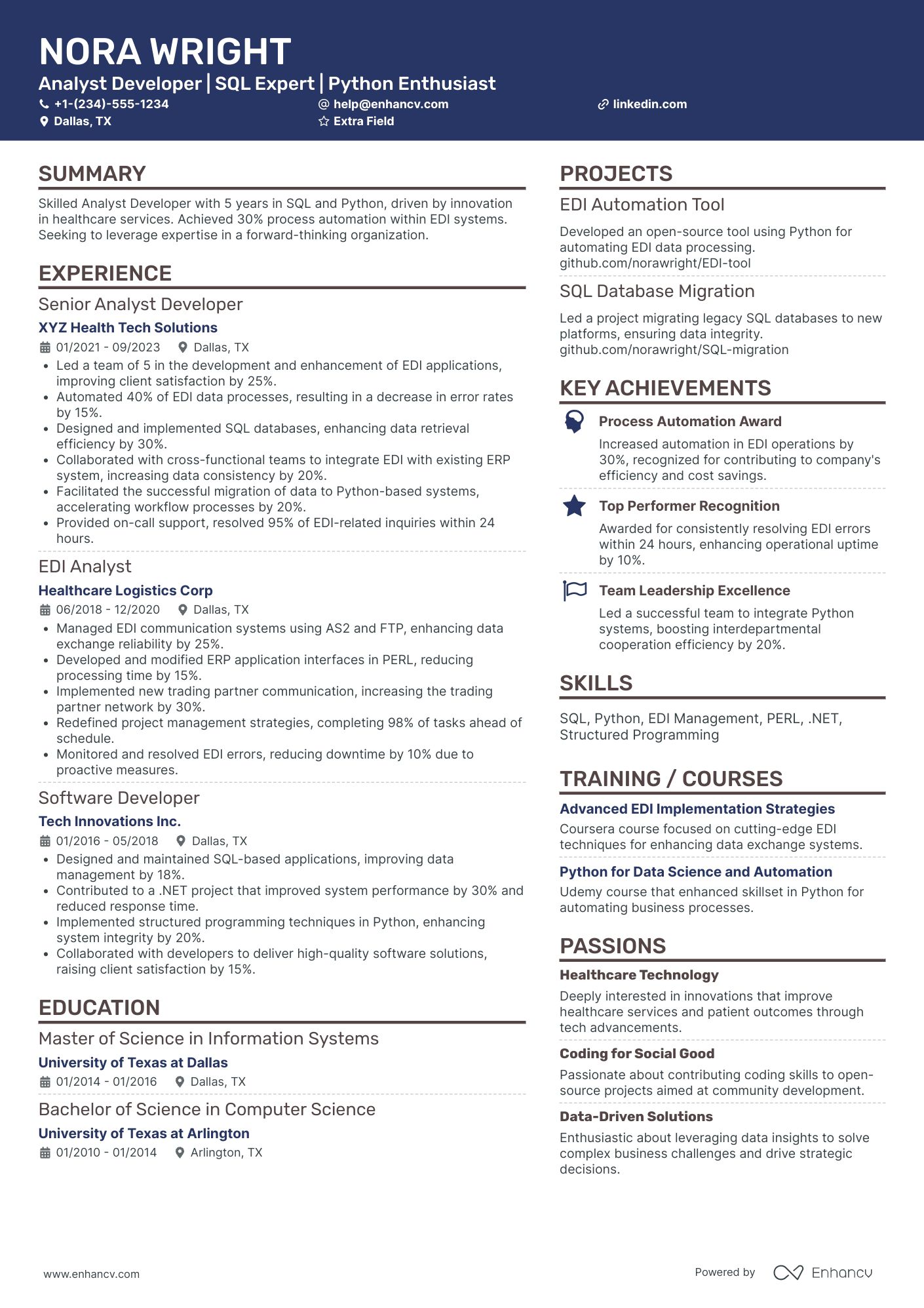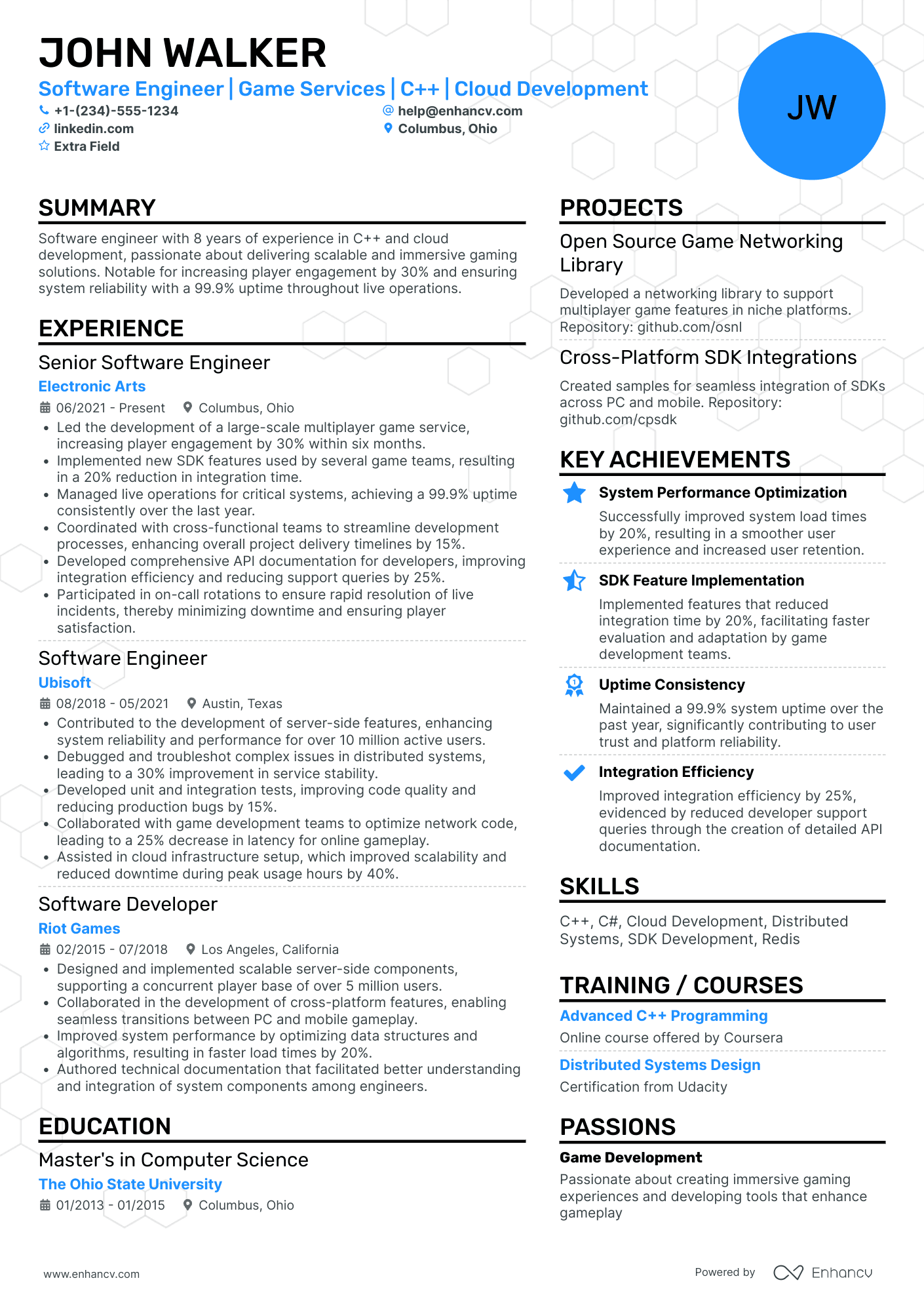Web development can take many different avenues, and .NET development is a great one.
Not only can you navigate .NET frameworks, but you’re also on top of the latest front-end and back-end languages.
Your .Net developer resume needs to show potential employers that you’re a pro in your field, as well as in the company’s tech stack.
Read our guide below and learn:
- What recruiters look for in a .Net developer resume that will grab their attention as a leading candidate.
- How to tailor your .NET experience to align closely with the specific job description.
- What technical skills will emphasize your proficiency in cross-platform deployment.
- The best way to showcase your .NET specific projects, focusing on architectural and optimization aspects.
- Feature ongoing professional development through .NET conferences and relevant coursework.
Browse our collection of resume examples and create a .Net developer resume that impresses recruiters and gets callbacks.
.Net Developer resume examples
By Experience
By Role
How to format a .Net developer resume
Choosing the best resume format and clearly conveying technical knowledge are key for .Net developer positions.
A reverse chronological layout focuses on work experience with positions listed in reverse chronological order. This tells a story of your career growth for companies.
When it comes to the number of pages, keep it at one page. Recruiters have an inbox full of resumes and a multi-page resume will be more of a hindrance than helpful.
Even if you have been in your field for over a decade and have a long work history, include only the most relevant information.
Focus on your recent achievements at competitive software companies, not a summer job you had at a grocery store 12 years ago.
For a technical position like a .Net developer, recruiters will expect industry etiquette starting with the file format.
Use a PDF, not a DOC. Hiring managers want a file that is secure, compatible, and preserves the original format without errors. Don’t even think about paper resumes..
Your GitHub portfolio or LinkedIn profile should appear in current, clickable links.
PDF files also make it easier for ATS to scan your resume, optimizing your chances of making it through to the next step in the selection process
The only exception to the above specifications is if the job application specifically requests otherwise. Always follow directions clearly on job applications.
The layout of a resume can differ by region – Canadian resumes may use a distinct format.
Is your resume good enough?
Drop your resume here or choose a file. PDF & DOCX only. Max 2MB file size.
The top sections on a .Net developer resume:
- Work experience that quantifies impact as a dot net developer in previous roles to show potential employers how you will achieve success
- Hard skills that capture your expertise of current full stack and soft skills that show your ability to work well with others
- Education in your field and certifications in reputable coding bootcamps to show hiring managers that you’re up to date on industry trends
- Summary or objective that communicates your value in the industry and tells potential employers that you have shared goals
- Additional sections of personal projects or experiences that show industry skills and achievements to impress hiring managers and land an interview
What recruiters want to see on your resume:
- A degree in computer science, software engineering, or credentials from a top tier coding bootcamp to show dedication to your field
- Work history at competitive software companies and industry achievements to stand out from other candidates
- Expertise of the .NET framework and the tech stack at your target company
- A live link to your GitHub or other online profile with a professional URL
How to write your .Net developer resume experience
Your .NET experience section should contain your most relevant job titles, along with 3-4 bullet points outlining your greatest achievements in the role.
Don’t just list generic responsibilities, show how you exceeded expectations and achieved success.
Let’s take a look at a real-life example of a .Net developer resume experience section.
- •.Net back-end development - ASP.NET MVC, ASP.NET Web API
- •Front-end development - JavaScript, CSS, JQuery, KendoUI, Bootstrap
- •Database - MS SQL, Store procedures and EF6
- •IIS/ Amazon Web Services
What’s wrong with this example:
- Doesn’t explain responsibilities or goals
- No action verbs
- No quantifiable impact
There are some good things about the above example, like the detailed tech stack, but it doesn’t quite work for an experience section.
It reads more like a list of technical skills rather than accomplishments. Let’s make some changes and try again.
- •Utilized ASP.NET MVC, ASP.NET Web API for .Net back-end development of program that generated $700K in revenue in Q1
- •Trained 12 front-end developers in JavaScript, CSS, JQuery, KendoUI, and Bootstrap which resulted in a 54% increase in productivity
- •Managed database using MS SQL, Store procedures, and EF6 with a 99% accuracy rate
- •Recognized for expertise in IIS/Amazon Web Services at corporate conference in 2021
What works in this example:
- Shows exactly how tech stack knowledge resulted in success by generating “$700k in revenue in Q1”
- Uses action verbs that show execution of skills and measurable success with “99% accuracy rate”
- Mentions industry award that recognizes “expertise in IIS/Amazon Web Services” in full stack technical skills
This .NET experience section is what recruiters look for. It’s important to not just make blanket claims of success but to provide evidence with quantifiable metrics.
How to quantify impact on your resume
As mentioned above, impact is more than just writing “successfully managed .NET framework” on your resume. You need to define success with measurable results.
Use real data, numbers, and statistics to quantify your achievements. If you’re not sure where to look for these metrics, start with the ones listed below.
Numbers that can strengthen your .Net developer resume:
- Number of users using the web app you developed using .NET framework
- Increased profit/revenue through improved conversion
- Increased web traffic on pages you updated
- Increasing conversion rate on the website by X%
- User experience improvement on programs you wrote using full stack
- Number of projects/pages/apps managed
- Number of people led on a team
- Increased productivity after providing technical support
- Improvement rate after debugging
Use these statistics as a guide while you comb through your achievements in previous roles. Clear evidence of success will stand out to recruiters and hiring managers.
How do I write a .Net developer resume with no experience
Not everyone has a decade of achievements to include on their resume. Everyone has to start somewhere.
If you’re writing a .Net developer resume with no experience, follow these steps:
- Choose a functional resume format - this layout focuses more on skills rather than experience. If you’re just breaking into the industry or have gaps in your timeline, this is a great way to keep the attention on your technical knowledge.
- Highlight transferable skills - so you haven’t worked as a dot net developer for a major software company, but maybe you managed the SQL server for library at your university. Show how your experience equipped you with a relevant skill set.
- List relevant certifications - a great way to show commitment to your field is by gaining certifications from coding bootcamps and other institutions. This shows your dedication to staying on top of industry trends and improving your skills. More on certification programs below.
How to list your hard skills and soft skills on your resume
Hard skills, sometimes referred to interchangeably as technical skills, are crucial for a strong .Net developer resume.
Potential employers want to know that you’re skilled in their full tech stack and current technologies.
If you’re listing programming languages and frameworks on your resume, hiring managers will assume you’re proficient. Only include relevant .Net developer skills that you’re confident in.
Here is an example of including .Net developer technical skills on a resume.
As you can see, hard skills are pretty straightforward. Soft skills require a bit more explanation.
Like achievements, blanket statements about interpersonal skills are open to interpretation. Show hiring managers exactly what you mean by providing specific examples.
This example provides clear examples along with quantifiable results of the candidate’s soft skills. Let potential employers know how you’ll fit into their company culture.
Top skills for your .Net developer resume
It’s important to stay on top of the most current trends and valuable skills of your industry. Particularly in a rapidly evolving field like IT.
Below are some of the top hard and soft skills for your .Net developer resume in 2026.
20 of the best hard skills for your .Net developer resume
- .NET Core
- ASP MVC
- Agile
- Web API
- IronPython
- IronRuby
- LINQ
- OOD
- SQL Server
- EF Core
- C#
- F#
- Visual Basic
- Ada
- Hangfire
- EF 6
- JavaScript
- JQuery
- JSON
- PHP
20 of the best soft skills for your .Net developer resume
- Communication
- Organization
- Analytical thinking
- Time management
- Leadership
- Creativity
- Adaptability
- Project management
- Innovation
- Accountability
- Customer support
- Flexibility
- Teamwork
- Perseverance
- Presentation skills
- Problem-solving
- Emotional intelligence
- Collaboration
- Curiosity
- Resourcefulness
How to list your certifications and education on your resume
Different companies will have their own education requirements, but typically it will be a degree in computer science, software engineering, or something similar.
Other companies may not require a degree at all and will instead let your experience speak for itself.
Your .Net developer education section will be pretty basic either way. Let’s take a look at an example.
Your education section only needs a few basic points of information:
- Name of your degree
- Name of your school
- Years attended
Other info like GPA or coursework should be left out unless requested in the job application.
Your certification section will be similarly basic. You only need to include the name of the certification and issuing institution like in this example.
Certifications are a great way to boost your employability and increase your value in the industry. Consider some of the certifications below for your .Net developer resume.
Best certifications for your .Net developer resume
- Microsoft Certified Technology Specialist (MCTS) .Net Framework 4.0
- CompTIA i-Net+ Certification
- ITIL® 4 Foundation - IT Service Management Certification
- Front-End Web Developer Professional Certificate
- Microsoft Developer Certifications
- Certified ScrumMaster (CSM)
- Certified Web Professional – Web Developer
- Master Certified Web Professional – Designer
- Certified Software Development Professional (CSDP)
- Certified Web Professional – Application Developer
How to write your .Net developer resume summary or objective
In short, a resume summary gives a brief overview of your career and value in the industry. An objective speaks to your career goals looking forward.
These days, the two are combined into a 3-4 sentence statement and referred to most often as a resume summary.
Let’s take a look at a senior .Net developer summary example.
What doesn’t work in this example:
- No quantifiable impact or measured outcomes
- Generic statements without evidence
- No clear achievements or industry accomplishments
Let’s take a look at the same summary with a few improvements.
What works in this example:
- Includes specific title of “Senior .Net developer” tailored for the target job
- Mentions industry skill of SQL database management and experience at major company
- Shows shared goal with target company of increasing database accuracy
A good formula for your .Net developer summary is to introduce yourself, share a career highlight, and end with a common goal for you and the target company.
Always tailor your resume to your target job by researching the company, studying the job description, and highlighting your relevant experience.
Optimize your resume summary and objective for ATS
Drop your resume here or choose a file.
PDF & DOCX only. Max 2MB file size.
Additional sections for a .Net developer resume
You’re almost ready to wrap up that amazing .Net developer resume!
Before you finish, consider adding additional sections to your resume that highlight relevant skills and experiences.
Additional sections you might include on your .Net developer resume are:
- Volunteer experience - Did you spend a summer as a volunteer coding tutor? That’s a great way to show your skills, especially if you include measurable success.
- Projects - Your GitHub might be full of projects that show off your full stack knowledge, but consider adding a section to go into detail about your most successful one.
- Awards - If you’ve achieved a significant or competitive award in your industry, consider highlighting it on your resume to let readers know of your achievement right away.
How to put a projects section on a .Net developer resume
If you choose to add a projects section to your resume, the format will be similar to your experience section.
Let’s take a look at an example.
- •Increased website traffic by 60%, earned an additional $25K in first 6 months
- •Created landing page using JavaScript and managed SQL server for company site
- •Improved customer satisfaction rating by 22%
What works in this example:
- Has a clear description of the project and industry skills like JavaScript and SQL
- Includes measurable success like earning “$25K in first 6 months”
- Used action verbs at the start of each bullet to convey role
Key takeaways for creating a great .Net developer resume
- Format your resume using a reverse-chronological layout to tell a story with your work history and show potential employers your commitment to the industry
- Quantify impact by using real data and measurable statistics as proof of your success rather than making generic statements
- List hard and soft skills to show your expertise in your industry and that you’re proficient in your target company’s tech stack
- Increase your employability and value in the field with certifications and projects to highlight your abilities
